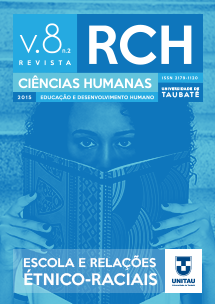O “MACUNAIMÊS” DE PARAGUAÇU: A INVENÇÃO DO BRASIL SOB OS OLHOS DE UMA HEROÍNA QUE VIROU ESTRELA
Keywords:
Cosmopolitismo, Cultura, Etnocentrismo, Globalização, Multiculturalismo.Abstract
Este artigo discute o cosmopolitismo como uma ininterrupta deriva cultural numa cartografia desterritorializada. O enfrentamento entre culturas diferentes é estudado aqui a partir do filme Caramuru: a invenção do Brasil, de Guel Arraes, rodado em 2001. O estudo parte do princípio que o multiculturalismo, aquilo que aglutina diferentes perspectivas identitárias diante do mundo, é um dos elementos responsáveis pela aculturação, a qual pode conferir a perda de certos traços originais quando se navega num processo migratório. Nesse sentido, muitas vezes, deslocados de seus países, os indivíduos são engolidos, mas nem sempre assimilados, pelo etnocentrismo de determinadas comunidades. Orbitam pelas ruas de grandes centros, mas nem por isso são integrados ao le grand marché de transnacionalização e globalização dos bens materiais e simbólicos que convertem cidadãos em consumidores. Apesar da tendência apocalíptica denunciada desde a Teoria Crítica da Cultura, é preciso observar que sim, o subalterno pode falar. No filme em questão, tal procedimento é alcançado graças à esperteza “sem nenhum caráter de sua protagonista”. A região periférica ganha voz graças a elementos discursivos, como a escritura, que permitem ao marginal ser ouvido. Com isso, o que se pretende mostrar neste artigo é como agentes sociais oriundos de diferentes locais conseguem resistir frente ao cosmopolitismo por meio da escrita que legitima seu lugar de fala e sua identidade suplementar.
Metrics
Downloads
Published
How to Cite
Issue
Section
License
The publications of the Human Sciences Journal are registered under the Creative Commons Attribution CC-BY license.
1. The contents of the manuscripts are the exclusive responsibility of their author.
2. It is allowed the total or partial reproduction of manuscripts published in the journal, provided that the source is cited.
3. When submitting their manuscript to the Journal, the authors certify that they are of their own authorship and unpublished (not published in any digital or printed media).
4. The copyright of the articles published in the Journal are of the author, with first publication rights reserved for this journal.
5. For disclosure purposes, the Journal may replicate the works published in this journal in other media, such as social networks (Facebook, Academia.Edu, etc.).
6. The Journal is of public access, therefore, the authors who submit manuscripts agree that they are of free use.
7. In case of any illegality, fraud, or other attitude that puts in doubt the honesty of the publication, especially the practice of plagiarism, the manuscript will be automatically rejected.
8. If the manuscript has already been published, it will be immediately removed from the base of the Journal, its citation linked to the Journal will be prohibited and the cancellation of the referred publication shall be reported in the next issue of the one in which the article was published. In case of the procedure for the withdrawal of the paper the authors will be informed beforehand, being guaranteed the right to a broad defense.
9. The personal data provided by the authors will be used exclusively for the services provided by this publication and will not be made available for other purposes or to third parties.





